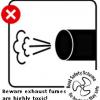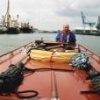Search the Community
Showing results for tags 'carbon monoxide'.
-
Macclesfield Express http://www.macclesfield-express.co.uk/news/local-news/safety-warning-after-macclesfield-canal-11043952 Safety warning after Macclesfield Canal boat tragedy Updated 13:43, 16 Mar 2016 - By Stuart Greer Christopher Reuben died from carbon monoxide poisoning on his boat Nomadic Chris Wimbush Christopher Reuben, 52, was found dead on his dawncraft called Nomadic on Macclesfield Canal near Springbank Lane bridge. Safety advice has been issued after a man was poisoned by fatal carbon monoxide fumes from the engine of his boat. Christopher Reuben, 52, was found dead on his dawncraft called Nomadic on October 15 last year. His vessel had been moored on the Macclesfield Canal near Springbank Farm, Springbank Lane, Adlington. An inquest at Macclesfield town hall on March 7 concluded that Mr Reuben, from New Moston, Manchester, died accidentally. Now Cheshire Fire and Rescue Service and the Boat Safety Scheme, a public safety initiative run by the Canal and River Trust and the Environment Agency, are urging boat owners and dwellers to make vital checks to avoid similar tragedies from happening. In the last 20 years, 30 boaters have been killed as a result of carbon monoxide, according to the Boat Safety Scheme. Graham Watts, manager of the Boat Safety Scheme said: “Over a million people are using boats safely each year, including thousands of people who live aboard on the inland waterways, but our reminder to crews and skippers is to treat the risks with due respect. “Prevention is the key to staying safe. All engines and appliances need to be properly installed, well maintained and used according to the instructions. “But carbon monoxide can occur or be made worse when ventilators are blocked, or fresh air is in short supply. Burning fuels need the right amount of oxygen to combust safely and it’s also incredibly important to keep exhaust fumes out of the boat’s interior. “If there’s a smell of exhaust fumes aboard, there could be deadly carbon monoxide in the cabin and that’s why our belt and braces advice is to fit a carbon monoxide alarm approved as meeting BS EN 50291-2. These are type best suited for boats. “And if an alarm go off, open the doors, hatches and windows and get ashore straightaway. “The skipper should turn off appliances and engines as they get out. If anyone feels unwell, giddy, confused or sick they should get very urgent medical treatment.” Nick Evans, head of prevention at Cheshire Fire Service, added: “I would encourage anyone living or holidaying on boats to ensure that they protect themselves by checking that their boat is fitted with both working smoke alarms and carbon monoxide detectors.” For more safety information visit www.boatsafetyscheme.org/co
-
Boaters using damp wood and logs in their stoves could be risking a triple whammy including increased costs, stove damage and carbon monoxide poisoning says the Boat Safety Scheme. It is crucial that wood fuel is kept in a dry, well-ventilated area. If not, the damp fuel will cause the stove to run at a lower temperature as the heat of the fire will be producing steam and so the stove needs much more fuel to keep the boat warm. Even worse, the steam dissolves-out flammable, acidic tars which will cling to and block up, as well as inevitably damage, the stove and its chimney. Damaged stove installations are more likely to leak combustion gases into the cabin space, and because of incomplete combustion as the fuel is damp, those gases are more likely to contain carbon monoxide (CO) – giving the vicious cycle that could see a highly toxic atmosphere in the boat. Stove flues lined with tar could also lead to a chimney fire... ...read more at http://bit.ly/woodfuelwisdom Hope it helps forumites to avoid being hit by unnecessary costs, carbon monoxide or fire. Regards Rob
- 41 replies
-
- solid fuel stove
- woodburner
-
(and 4 more)
Tagged with:
-
Link to safety warning for certain models built before 2009. http://www.beko.co.uk/Pg/LPGConverterKit
-
The MAIB has published its report on the carbon mon deaths on the Broads cruiser Love for Lydia. It makes grim reading, it was their first night on board their newly acquired boat. The surveyor had advised them to get a CO monitor, but they hadn't done so. Running the inboard petrol engine to charge the batteries meant that CO found its way from the wet exhaust under the pram canopy and swiftly forward into the forepeak living area. https://assets.publishing.service.gov.uk/media/591058f840f0b67b04000002/MAIBInvReport9_2017.pdf
-
We have Fire Angel CO alarms and one has just started to go off. We are on our mooring and getting power from our bollard. We haven't run the engine for a few weeks and have not yet lit our stove this autumn. We're cooking (by gas) on the boat and on Sunday we made breakfast and went out for the day (by car). When we cam back on Monday morning the alarm was going reading 38ppm over our bed. Since then the recorded level has been going up and down from the usual 0 to as much as 41 ppm. There is no gas coming into the boat unless the cooker is on (bubble tester). There is a smell similar to rotten eggs (hydrogen sulphide) strongest near the stern bed area. The forward (kitchen/living space) monitor is reading 0 to 13 ppm. I can't locate the source of the smell which is obvious but not powerful. Does anyone have any idea where to look next? Are the monitors sensitive to anything other then CO?
-
MAIB report/bulletin about the deaths that occured in December 2019. Always sad reading. Linky thing
-
A public consultation on a proposal to introduce mandatory new Boat Safety Scheme (BSS) Requirements for carbon monoxide (CO) alarms on boats opens today Friday 17 August and will run to Friday 9 November 2018. The Boat Safety Scheme (BSS) is running a public consultation on proposals that have the full support of its stakeholder and management committees. It is proposed to introduce a mandatory new BSS Requirement for suitable carbon monoxide (CO) alarms in good condition and in suitable locations on all classes of boat with accommodation spaces. The changes affect all classes of BSS examination, private boats, boats used for hire and other non-private boat classes. The BSS proposals are presented as both necessary and proportionate risk controls and your comments upon them are welcomed. The consultation is open until 16:30 on Friday 9 November 2018. The BSS will also be taking the opportunity to seek the respondent’s views on the future possibility of introducing similar checks concerning smoke alarms for private boats. Please share news of the consultation https://www.boatsafetyscheme.org/abo…/co-alarm-consultation/
- 148 replies
-
- 1
-

-
- carbon monoxide
- alarms
-
(and 2 more)
Tagged with:
-

Warning about using portable gas appliances on boats
Rob@BSSOffice posted a topic in General Boating
Those of you in the North West may have caught the news that two teenage campers are suffering serious facial burns after a portable gas stove they were using exploded on Thursday evening. North Wales Fire and Rescue is warning holidaymakers not to use such equipment inside tents and caravans, saying that the inherent risks are greatly magnified in the confined space of a tent or caravan compared with use outdoors. We are echoing that message. It was only in 2010 when two boaters were hospitalised with very nasty injuries after changing a a small stove cylinder went horribly wrong. You may think these stove canisters are very small, but if the liquefied gas inside escapes, it will re-gasify and expand 250 times and it has enough energy to cause a seriously harmful explosion. this stove caused an explosion so powerful it put two Norfolk Broads boaters in hospital We have more information on this web page www.boatsafetyscheme.org/stay-safe/fire-safety-for-boats/portable-gas-appliances . Go boating this weekend; Stay-safe




